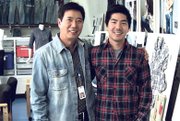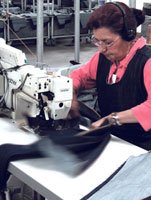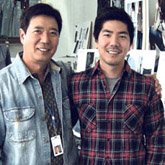L.A.'s Largest Blue Jeans Factory Has a Formula for Success
On the floor of the brightly lit factory, sewing machines hum as workers put the finishing touches on thousands of darkly tinted blue jeans that will eventually sell for $140 to $220. In another row, seamstresses stitch together soft beige corduroy pants whose pockets are made of a bright red plaid material.
Inside this 400,000-square-foot factory the size of eight football fields, some 760 employees come to work every day, making 32,000 pairs a week of premium-denim blue jeans under the AG Adriano Goldschmied label and the less pricey Big Star brand, which sells for around $100. The two labels are owned by Koos Manufacturing in South Gate, Calif., which is the largest blue-jeans factory in the Los Angeles area.
Despite the chill in the economic climate, Koos is expected to see a nearly 25 percent rise in business, with revenues jumping from $130 million in 2008 to $160 million this year, according to Yul Ku, who founded the business in 1978 in downtown Los Angeles before landing in South Gate in 1993.
While many local blue-jeans makers working with premium-denim labels feel fortunate to be holding steady, Koos is racing ahead. One of the reasons is that Koos is aligned with The Buckle Inc., the Midwest retail chain that has seen double-digit increases in its same-store sales despite a general shopping malaise among consumers worried about their jobs and the economy. Teens continue to snap up trendy jeans and clothing at the chain, whose same-store sales rose 14.3 percent in the fourth quarter of 2008. In February, same-store sales jumped 21 percent.
Since 2003, Koos has been manufacturing The Buckle’s private-label blue jeans, called BKE, at Koos’ auxiliary factory in Mexico, which employs 1,800 workers near the town of Aguascalientes. Every week, the Mexican workers pump out 70,000 pairs of blue jeans for The Buckle and produce 80 percent of Koos’ Big Star label.
According to Stacey Manary, the denim buyer for The Buckle, based in Kearney, Neb., Koos now makes about 40 percent of all the denim sold by the retailer, which has nearly 400 stores in 40 states. In fiscal 2007, The Buckle’s revenues were $792 million. “Generally speaking, they offer a great quality product and pay a lot of attention to detail,” she said. “They are a great firm to work with.”Good partners
The attention to detail can be seen in the immaculate condition of the factory, which is situated in an industrial area filled with auto-repair shops and other large factories. The floors are spotless. Sewing areas are well-ventilated. And Yul Ku himself sits in the middle of a vast design area where there are no walls for offices, even for the founder of the company, who is given to wearing denim jackets.
“The company is growing anywhere between 25 percent and 35 percent, and that’s a low number,” Ku said. “Everybody’s business is down, but our service is good and our product is good.”
Unlike other Los Angeles blue-jeans producers, Ku is manufacturing a high-end label he owns and controls. But it wasn’t always that way. When he opened his Mexican factory in 1988, he was making low- and mid-tier blue jeans for retailers such as Abercrombie & Fitch and Gap Inc. When the retailers started putting pressure to lower price points, Ku decided to change his business plan and partner with The Buckle to keep his profit margins at a respectable level.
Then in 1999, he met Italian designer Adriano Goldschmied, and a year later, the two launched the AG Adriano Goldschmied label. In 2004, the Italian designer left, with Ku buying the label and setting up 15 AG Adriano Goldschmied stores and eight outlets.
Now, Ku’s son, Sam, heads up the AG division, working on fine-tuning wash techniques that give the premium jeans a natural, vintage look that fetches a higher price tag that can go for more than $300 in stores. “I think in the past four years, the challenge for the AG brand was to figure out how to stand out from the crowd. There were a lot of premium-denim brands out there popping up every season,” Sam Ku said. “We solved this challenge by developing the wash to make it look aged.”
And not one to stand still, Yul Ku said this fall the company will launch a new mid-tier label called NBD, which stands for “Natural Blue Denim” and will be introduced at the Project Global Trade Show in Las Vegas in August. Steady but slow
While retailers have been singing the denim blues lately, studies show that last year, premium-denim sales at department stores and national chains were up 20 percent to $425.5 million in 2008. Topher Gaylord, president of Seven For All Mankind, one of the largest premium-denim brands in the United States, said he expects his label to see single-digit increases in business through new store openings and new products. But in general, the premium-denim category is starting to show some softness.
That’s a fact that denim factories in Los Angeles can verify. “The overall situation in denim is down,” said Bob Kim, president of Jakin LLC, whose 150 workers sew between 10,000 to 15,000 pairs of blue jeans a week for labels such as Seven For All Mankind, J Brand and Helmut Lang. “Our business is holding steady.”
With stores reining in inventories and waiting to the last minute to order, it is difficult to predict business. “Things started getting delicate since October, November and December. Stores have reduced their orders a lot since the beginning of the year,” Kim said.
At New Fashion Products Inc.—whose factory on South Main Street has 200 workers sewing blue jeans for J. Crew, DKNY Jeans, Habitual and Armani Exchange—business is even but challenging. “There has been a lot of discussion around price,” said Bobby Ahn, president and chief executive of the company started by his family in 1974. “It’s about how to position the product going forward. Our customers are doing what they can to be successful.”
Customers at Indigo Group USA in Gardena, Calif.—which sews blue jeans for labels such as Rock & Republic, Polo Ralph Lauren’s RRL and Black Label, and Current/Elliott—are waiting to place orders. “It is much more about Immediates and reducing exposure to inventory,” said Jeremy Lew, a partner in the company, which has 300 workers making 10,000 to 15,000 blue jeans a week. “There is also a lot of good faith going around right now. There are vendors, wash houses and thread-supply facilities that haven’t been paid. It’s a ripple effect from the retail sector not paying their bills. And if they are paying, they’re asking for discounts.”
























